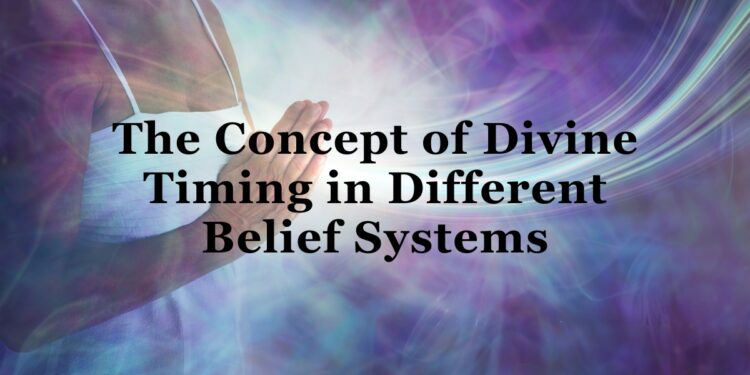No products in the cart.
The Concept of Divine Timing in Different Belief Systems
This post contains paid and/or affiliate links. I make a small commission at no extra cost to you. Please see our Privacy Policy.
Divine timing holds a significant place in various belief systems worldwide. It goes beyond the surface-level interpretations often associated with new-age beliefs and the Law of Attraction. Embracing divine timing means understanding and aligning our timing with the universe’s. This alignment allows us to tap into the transformative power of divine timing and experience its universal significance.
This article delves deeper into divine timing and its relationship with belief systems. We explore how different spiritual traditions interpret divine timing and highlight the underlying principles that unite them. Understanding divine timing from various perspectives can unlock its transformative potential in our lives.
Join us on this journey as we embrace the wisdom of divine timing and discover how it can accelerate our personal growth, manifest our dreams, and bring us closer to our highest potential. Let’s explore the powerful alignment of our timing with the universe’s timing and unlock the hidden possibilities that await us.
The Transformative Power of Divine Timing
Divine timing has a transformative power that can only be fully understood through personal experience. When we align ourselves with divine timing, we open ourselves up to a flow of synchronicities and opportunities that lead us toward our highest potential. This alignment requires trust and surrender to the unfolding of events, letting go of our need for control and allowing the universe to guide us.
Through this process, we learn the art of patience and the ability to embrace discomfort and uncertainty. Divine timing teaches us that everything is happening in the present moment and that there is always the perfect amount of time for everything we desire. By slowing down and aligning ourselves with divine timing, we can accelerate our growth and manifest our dreams with greater ease.
Divine Timing in Different Belief Systems
Divine timing exists in various belief systems worldwide, each with its interpretations and perspectives. In Christianity, divine timing is often associated with God’s plan and providence, where everything happens according to His perfect timing.
In Hinduism, divine timing is seen as the result of past actions and karma, where one’s destiny unfolds according to one’s previous deeds.
In Buddhism, divine timing is related to the concept of dependent origination, where all things are interconnected and arise in dependence on causes and conditions.
Other belief systems, such as New Age spirituality and indigenous traditions, have unique understandings of divine timing.
Despite these differences, the underlying message is the same. There is a higher intelligence at work in the universe, and when we align ourselves with it, we can experience the flow of divine timing in our lives.
Embracing Divine Timing in Your Life
Embracing divine timing in our lives is a powerful practice that requires us to let go of the need for control and trust in the process. It’s about aligning ourselves with life’s natural rhythms and cycles and surrendering to the universe’s guidance.
We must release attachments to specific outcomes to embrace divine timing and learn to embrace the present moment as it unfolds. This means accepting that everything is happening in perfect timing, even if it doesn’t align with our timeline.
Trusting the process is an essential aspect of embracing divine timing. It involves cultivating a deep trust in ourselves and the universe, knowing everything is unfolding exactly as it should. It requires us to surrender to the wisdom and intelligence of the universe, allowing it to guide us towards our highest good.
Letting Go
Letting go is a fundamental part of embracing divine timing. It means releasing our need for control and surrendering to the greater flow of life. By letting go, we create space for new opportunities and possibilities to emerge.
Letting go also means releasing any resistance or attachment to specific outcomes. It’s about trusting that the universe knows what is best for us and that the right things will come at the right time. It may require us to confront our fears and beliefs that hold us back, but by letting go, we open ourselves up to the transformative power of divine timing.
Trusting the Process
Trusting the process is about having faith in the journey we are on. It’s about understanding that a divine plan is unfolding, even if we cannot see it in the present moment. Trusting the process allows us to surrender our need for immediate results and instead have patience and faith in the universe’s timing.
When we trust the process, we align ourselves with the flow of life and open ourselves up to unexpected opportunities and synchronicities. We release the pressure of trying to control every aspect of our lives and instead allow ourselves to be guided toward what is meant for us.
Alignment and Surrender
Embracing divine timing requires alignment with ourselves and the universe. It means listening to our intuition and following the inner guidance that leads us closer to our purpose and desires. When we align ourselves with divine timing, we step into a state of flow where everything unfolds effortlessly.
Moreover, surrender is an integral part of embracing divine timing. It’s about surrendering the ego’s need for control and surrendering to the wisdom and intelligence of the universe. By surrendering, we acknowledge a greater plan at work and that we can trust in its unfolding.
Embracing divine timing is an ongoing practice that asks us to let go, trust the process, align ourselves, and surrender. By doing so, we open ourselves up to the transformative power of divine timing and invite greater ease and fulfillment into our lives.
Conclusion
Exploring the concept of divine timing in different belief systems reveals the universal significance and transformative power of aligning ourselves with the universe’s timing. The message remains the same, whether through the lens of Christianity, Hinduism, Buddhism, or other spiritual traditions. When we surrender to the flow of divine timing and trust in the events unfolding, we can experience profound growth and manifest our dreams more easily.
Embracing divine timing is a practice that requires letting go of control, embracing discomfort, and cultivating a deep sense of trust in ourselves and the universe. By aligning ourselves with divine timing, we open ourselves up to a flow of synchronicities and opportunities that lead us toward our highest potential. Through this alignment, we can tap into the transformative power of divine timing.
So, let go, trust the process, and embrace the transformative power of divine timing in your own life. Remember, divine timing transcends individual belief systems, and its principles can be applied by anyone willing to surrender, trust, and align themselves with the rhythm of the universe. By embracing divine timing, we can easily navigate life’s challenges and experience the profound shifts and growth that come with it.
FAQ
What is divine timing?
Divine timing is about resonating with the timeless Now and allowing the universe’s timing to align with your own. It is a state of committed surrender and trust in events unfolding.
How does divine timing transform our lives?
When we align ourselves with divine timing, we open ourselves up to a flow of synchronicities and opportunities that lead us toward our highest potential.
How do different belief systems interpret divine timing?
Different belief systems, such as Christianity, Hinduism, Buddhism, and New Age spirituality, have unique understandings of divine timing. However, the underlying message is the same – a higher intelligence is at work in the universe. When we align ourselves with it, we can experience the flow of divine timing in our lives.
How can I embrace divine timing in my life?
Embracing divine timing requires letting go of the need for control, trusting the process, and aligning yourself with life’s natural rhythms and cycles. It also involves surrendering to the universe’s guidance and cultivating a deep trust in yourself and the universe.















